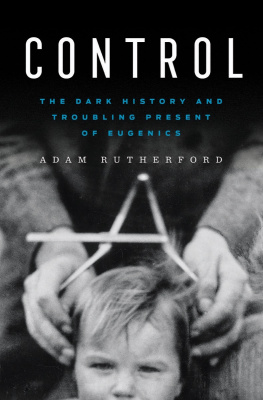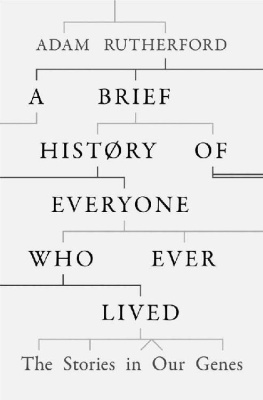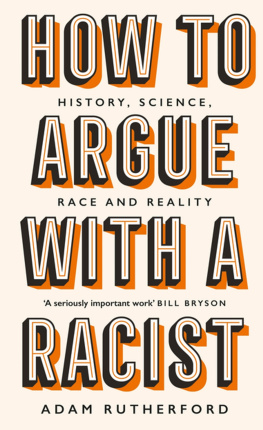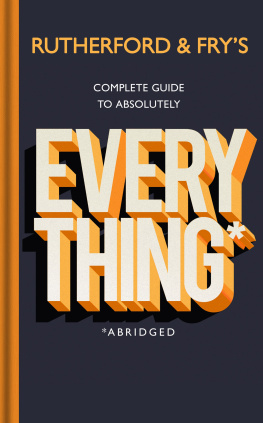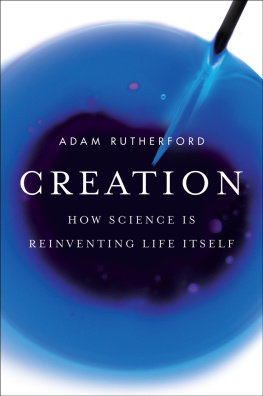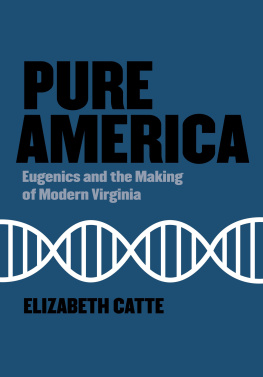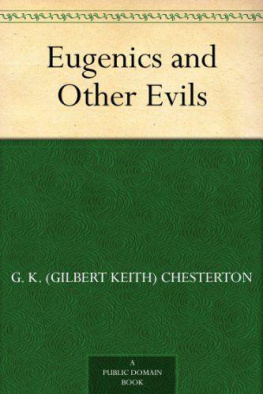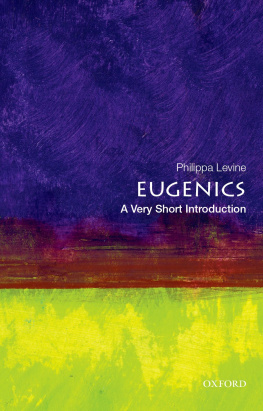
CONTROL
THE DARK HISTORY AND TROUBLING
PRESENT OF EUGENICS
ADAM RUTHERFORD

W.W. NORTON & COMPANY
Independent Publishers Since 1923
Dedicated to my friend Marcus Harben (March 5, 1974February 11, 2021)
and his beautiful legacies, Jazmin and Joseph, whose existence makes this a world worth fighting for
I f you have children, or are ever planning to, you will surely want them to live well. You hope that they are free from disease, and that they fulfill their potentialin school, in physical fitness, in their allotted share of happinessand that they will not suffer pain. What are you willing to do to ensure this?
On November 28, 2018, I awoke to find my phone battered with thirty-three new text and voice messages. It was mercifully only the second time this had happened, the first being when my telephone and email had been published on an American White supremacist website, with the unsolicited invitation to contact him. This happens when you write about race.
This time was different though and, perversely, more troubling. The messages were all requests from a harried media, asking for my comments on something that had happened in Hong Kong while I was sleeping. At a medical conference, a scientist had announced the birth of twin baby girls that he had genetically modified as embryos and reimplanted into their mother. As far as we know, Lulu and Nana (their given pseudonyms) were the first gene-edited humans ever born.
My colleagues and I in the scientific and media worlds struggled to get our heads round just what had happened. Where were these babies, and were they healthy? How had this scientist bypassed the international laws and agreements that expressly forbid such practices? There was a scramble to verify the scant information that the researcher himself had released to the public, via a presentation at the conference and a couple of slick YouTube videos. Professor He Jiankui, a biophysicist from the Southern University of Science and Technology in Shenzhen, had attemptedand by his own data, failedto introduce a naturally occurring genetic mutation into two fertilized human embryos. His intention was to grant immunity to HIV infection to the children who would grow from those clumps of cells. The technique he had used is called CRISPR-Cas9, a gene editing tool that over the ten years since its invention has radically changed our ability to control the source code of biology. The father of the girls has AIDS, Professor He revealed, and the proposed genetic rewrites would theoretically protect the mans children from the risk of HIV infection for life. A third childwe now know she is called Amywas also confirmed to have been born, though further details are even more opaque.
He Jiankui was widely and immediately condemned for this human experimentation. It was experimentation, not therapy or medical treatment or intervention. He wasnt trying to cure a disease or treat a condition. Each of the girls genomes was indeed modified in this procedure, but neither change resulted in the genetic variant that naturally bestows the bearer with HIV immunity. The proposed edits had failed, and he had effectively conducted a genetic experiment on those children, whose fate and health is still not publicly known.
A frenzied press called him a mad genius and Chinas Frankenstein. The term genius is inappropriate here; the attraction of the CRISPR-Cas9 tool is that it is designed to be easy to usea genetic edit in a lab animal that might have taken years to achieve two decades ago can now be done in a few days by a student, with much greater control. The embryos were examined, sampled, selected and reimplanted with techniques used in reproductive clinics and genetic diagnosis labs thousands of times a day all around the world. He had merely combined two fairly standard techniques in genetics and reproductive medicine to do something that is morally and ethically reprehensible, and indeed criminal.
As for Chinas Frankenstein, knowledgeable readers like to point out that Mary Shelleys Frankenstein was the scientist and not his unnamed creation. But wise ones know that Dr. Frankenstein was the monster. The ethics of experiments on humans are well established, and necessarily constrained. Experimentation of this sort is broadly prohibited under various conventions, including the Nuremberg Code and the Declaration of Helsinki. The story of what happened next is shrouded in mystery, but we know that a year later He Jiankui was sentenced to just three years in jail and a fine of three million yuan (around $470,000). He was released in March 2022.
The legal, ethical, moral and scientific issues thrown into relief by the birth of Lulu and Nana are enormously important, and later in the book I will examine this tragic and wicked story in detail. The principles in play are not new, but the technology employed by He Jiankui to put them into practice is. Questions about modifying life, and human life specifically, are at least as old as Frankenstein Mary Shelleys novel was inspired by the then new sciences of physiology and galvanism. Throughout the twentieth century, fictions and fears grew alongside the field of genetics as it blossomed and revealed the underlying software in which life is written. In the postwar era, technological advances such as the contraceptive pill helped charge a social revolution where sex could be decoupled from conception, and women could claw back some measure of reproductive autonomy. The invention of in vitro fertilization in the 1970s has resulted in the birth of several million people who previously could never have existed.
Science continually tinkers at the edges of the known, unpicking the fabric of reality, sometimes with a specific purpose in mind, more often fueled by slakeless curiosity. We invent tools to help people and answer questions about the universe, and everything in it. But science does not operate in a vacuum, and its purpose is ultimately in the service of humankind.
We are technological creatures, and we have been continuously crafting and designing nature to serve our needs and desires since long before our species emerged on the landmass that we now call Africa. Genetics is a new science, a century old at most, and really just a few decades old in any meaningful sense. The fusion of genetics with evolution is similarly only a twentieth-century field of research, as we came to understand genes as the mechanism by which evolutionary change occurs. But crudely, genetics and evolution are only the study of sex and families, which have been the primary fixations of humans since before the origin of our species. People like me examine sex lives and families at a resolution that removes every drop of joy inherent in both: at a molecular level, across populations and over oceans of time. In doing so we have made great leaps forward in understanding how human heredity works.
However, all science is political. This is a statement that causes vexation among some who confuse the ideals of science with its reality. We aim for an objective description of the world, and try to minimize the grubby political, personal and psychological biases that hinder our view of reality. But in all scienceand especially the scientific study of humanswe inherit knowledge infected by the contingencies and political obsessions of our scientific forebears, whether we know it, deny it or acknowledge it. Sometimes the biological and the political are deeply intertwined. For example, in the Neolithic, we sought to control livestock and plants in order to ensure a regular supply of food, thus inventing agriculture and farming, and with that trade and commerce, and the foundations of civilization. In doing so, some pastoralist societies inadvertently selected a genetically encoded ability to digest milk after weaning, which gave them a rich source of food that had been unavailable to their lactose-intolerant ancestors. Some seven thousand years later, this dairy schism became a key distinction between the Hutu and the Tutsi, imposed by German and Belgian colonists seeking to sow racial disharmony. Indeed, some White supremacists today mistakenly think this evolutionary adaptation to dairy farming is a mark of European purity, ignorant of the fact that it also arose in Kazakh, Ethiopian, Khoisan and Middle Eastern pastoralists who also evolved alongside the mammals they milked.
Next page
